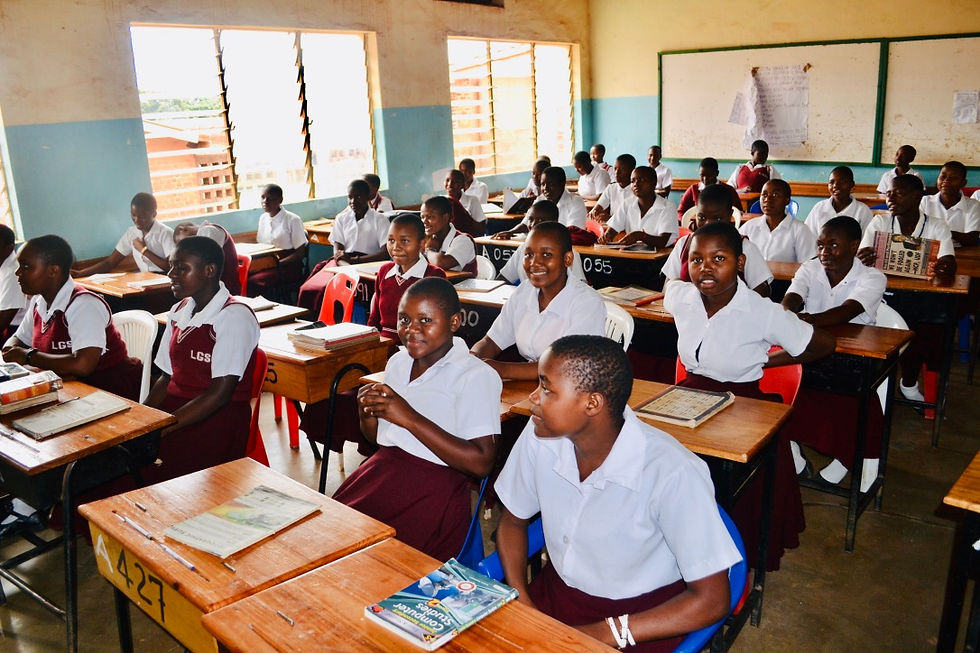Educate a girl, educate a nation
- Missio Scotland
- Sep 29, 2021
- 5 min read

Gerard Gough
SINCE becoming Missio Scotland’s Communications Officer in 2016, I have had the privilege of being able to write and speak about the work that we—the Pope’s official charity for overseas mission—carry out throughout the world where the Church is young or poor.
Much of this communication takes place within our Catholic school communities, in particular our primary schools, where we are the designated charity. I derive great joy in speaking to staff and pupils in these environments, informing them of the difference that their donations make to people in all five continents and encouraging them to continue supporting us so that we, in turn can support those in need. I also stress to them the importance of education in their lives, as it’s something that we often take for granted compared to those for whom it is literally a lifeline and something which they cherish on a daily basis.
Luckily, having been able to visit some of the projects in person, I can share personal insights with them to help deepen their understanding of these truisms, be it via a deaf school in Uganda, where Spiritan Fathers help to feed, clothe, educate and find work after school for hundreds of pupils from all over the country or a school in Zambia run by the Servants of the Holy Spirit Sisters, who provide an education for orphans and vulnerable children—many of whom live with HIV/AIDS or who have been rescued from human traffickers.
These experiences remind me of just how important my role within Missio Scotland is and the responsibility of sharing experiences as a means of education is great. It’s something that Pope Emeritus Benedict XVI himself underlined in his 2012 World Day of Peace message when he stated: “I cannot fail also to appeal to the world of the media to offer its own contribution to education. In today’s society, media persons have an important role in forming minds. The mass media have a particular role: they not only inform, but also form the minds of their audiences, and so they can make a significant contribution to the education of young people. It is important never to forget that the connection between education and communication is extremely close: education takes place through communication, which influences, for better or worse, the formation of the person.”
Education in Malawi
Malawi suffers from many of the problems that affect the education system in other African countries, namely: a lack of suitable buildings; a lack of teaching materials; a lack of teachers; a poor teacher to student ratio; and schools fees, which can often mean a child has no access to education.
There are also still many barriers that exist when it comes to girls’ education. While the literacy rate of children in Malawi is relatively high in comparison to its neighbours, with 72 percent of the youth aged 15 to 24 able to read and write, the state of girls’ education in Malawi is still in critical condition. Around 85 per cent of Malawi’s population live in rural areas and girls are under-enrolled and outnumbered in the majority of its primary schools. That said, primary education attendance does not automatically mean that they will go on to pursue higher level education, as only 6 per cent of girls graduate from secondary school each year, with only 2.9 per cent going on to seek post-secondary education studies.
Multiple barriers still exist for girls to seek out proper primary and secondary education. Child marriage in Malawi is still prominent, with more than 40 per cent of girls married by the time they are 18. The prevalence of HIV/AIDS is another factor preventing girls from finishing school. An estimated 12 per cent of the sexually active population in Malawi live with the virus. Sadly, and all too commonly, however, one of the biggest barriers to girls receiving an education is poverty. Due to widespread poverty in Malawi, children’s education often proves to be a heavy burden for many families. When faced with a choice, parents will often choose to invest in education for their sons instead of daughters. There is a dire need to promote the education of women and children in Malawi in order to improve their quality of life.

Love and service in Likuni
Missio Scotland has attempted, in some small but nonetheless important way, to try and fill that void in one school in the Archdiocese of Lilongwe, in one of the first parishes established there. Likuni parish was established in 1903 by the White Fathers. Education was one of their main priorities and it was they who established the Likuni Girls Secondary School in 1963. Some 650 girls attend the school, which is run by headmistress Sister Amelia Nyendwa (above), a Teresian Sister from neighbouring Zambia. Her smile, warmth and friendliness belies some of the stresses and strains that come with her post, which she has held for the past five years. While speaking of the need to renovate the school buildings, she touched upon the factor of fees often posing a problem for many girls and their families.
“There is a saying that goes ‘educate a girl and you educate a nation,’ and that’s what we are doing at our school,” Sr Amelia said. “The students we have come from far and wide. Many come from rural areas and those girls, in particular, may encounter problems when it comes to paying fees because if there is no rain or not enough, their families will have no crops and consequently, little money. We do our best to keep them in the school, but sometimes they are sent back. When that happens, then that means we’ve failed them.”
At Missio Scotland we are keen to support Sr Amelia and her colleagues at Likuni Secondary School so that such a thought doesn’t cross their minds. To that end, we elected to sponsor the fees of 10 girls at the school—£150 per child, per term, of which there are three.

Supporting students
While in Malawi, I was fortunate enough to meet three of those students (above), who thanked us for our support, stated their dedication to continued working and studying hard and spoke passionately about their hopes and dreams for the future. Upon my return to the Missio Scotland office, each girl wrote a thank you letter to us, each of which was peppered by some common themes: gratitude and prayers having been answered; how it is often a struggle to pay fees; their family situations; not taking anything for granted; and a determination to succeed. One thing that stood out from all the letters though, was the fact that each girl seemed to have their fellow students best interest at heart and showed this, in part, by encouraging both ourselves and our partners in the Pontifical Mission Societies around the world to continue supporting their education. One girl, Eunice Banda, even spoke of how the help she has received from Missio Scotland will act as a catalyst for her to help others in future.
“I promise that I will work extra hard so that you will be proud of me,” she wrote. “I will also work hard to fulfil my goals so that in future I can be in a position to help the needy.”
Although our assistance is a mere drop in the ocean in terms of overall support for education in Malawi, my interaction with the students during my time in the country and the correspondence that followed showed that it has the potential to make a big difference in their lives and the lives of others. As St Teresa of Calcutta said: “Do small things with great love.” If we use that as our starting point, as we did here, Malawi, and the world, will be all the better for it.
To learn more about the work of Missio Scotland you can like us on Facebook: http://www.facebook.com/missioscotland, and follow us on Twitter @Missio_Scotland
To donate to Missio Scotland, visit: http://www.missioscotland.com/donate call us on: 01236 449774 or send donations to: Missio Scotland, St. Andrews, 4 Laird Street, Coatbridge ML5 3LJ
gerard@missioscotland.com






Comments